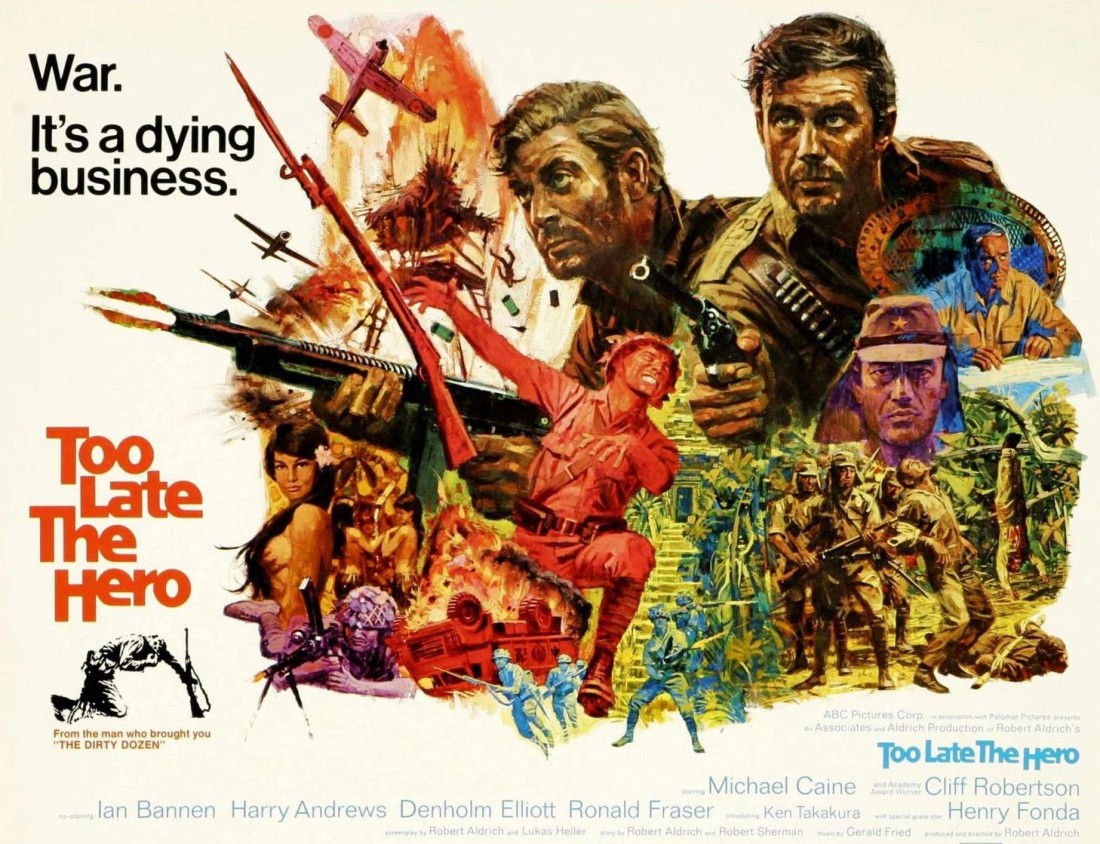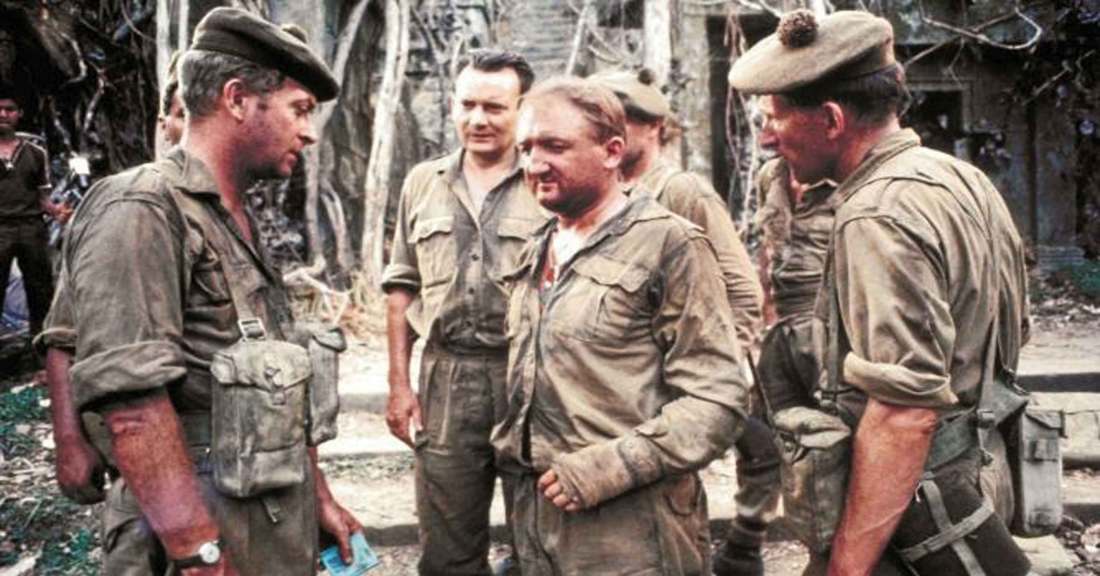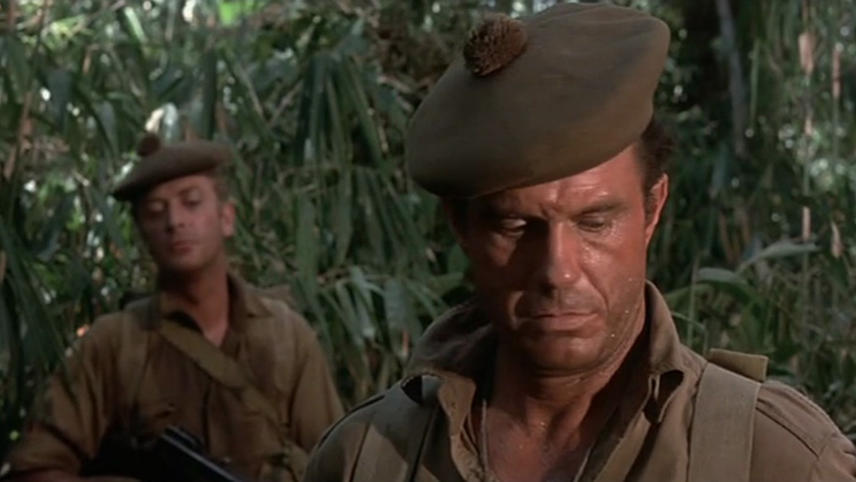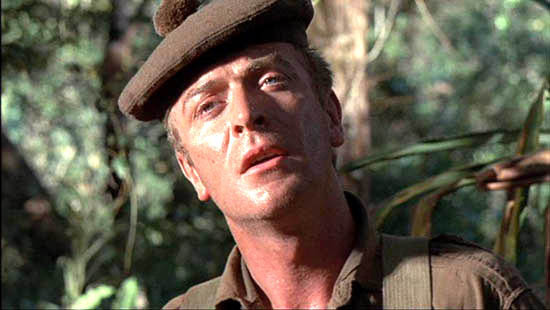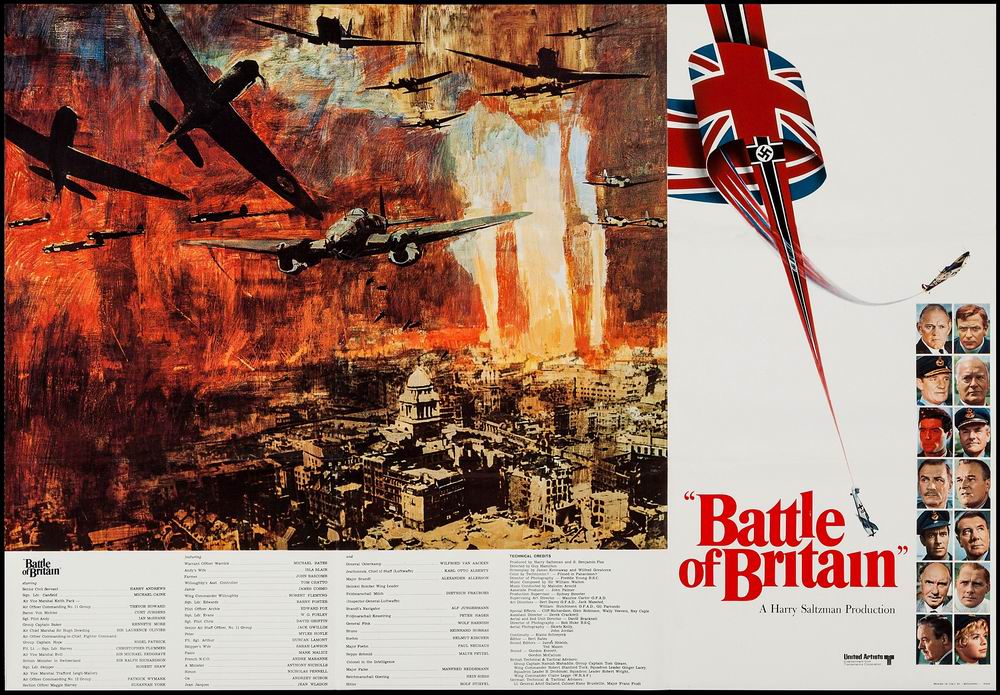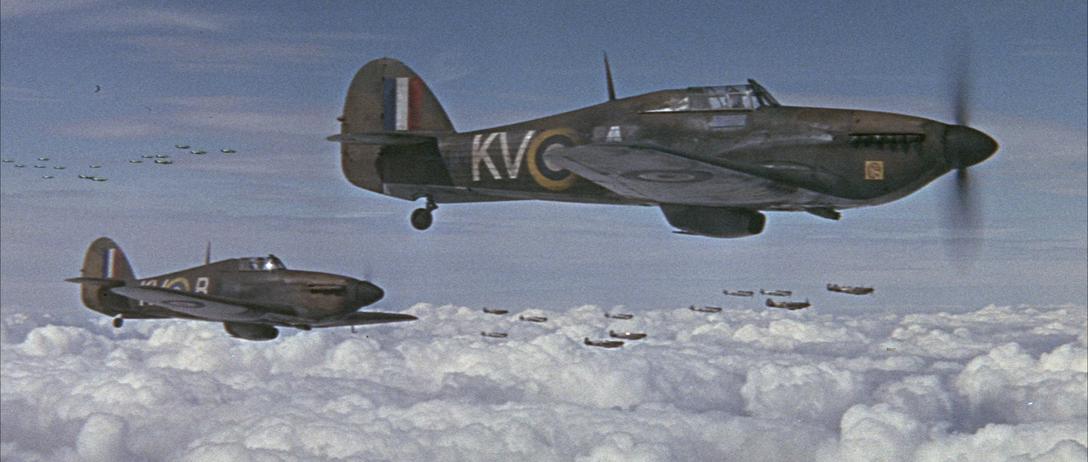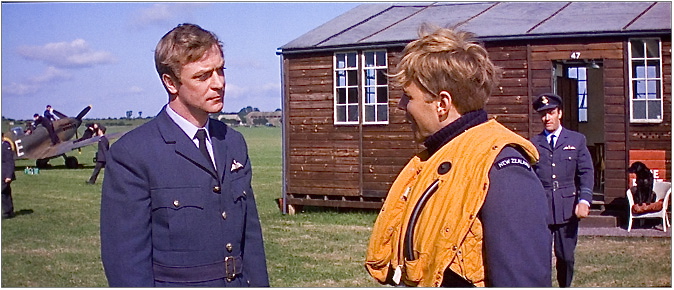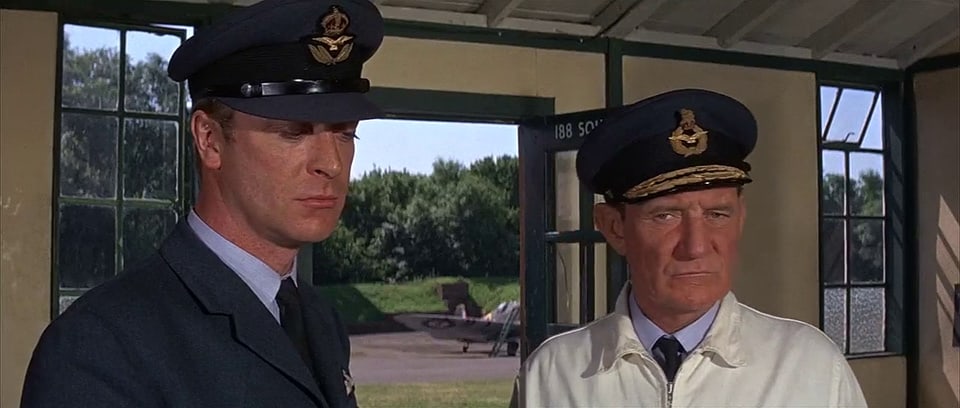“We scored a goal! Terry scored a goal!” Captain John Colby

For Escape to Victory we make a return to the war with Caine playing Captain John Colby an England international footballer. Now being held in a German prisoner of war camp a chance meeting with an ex-German player leads to them arranging a match between the POWs and a local army base. Before they know it events quickly spiral out of their control as the match is hijacked as a potential propaganda victory for the Nazis and an opportunity to organise an escape for the allies.
Sport and movies have traditionally never been especially happy bedfellows. Transporting the pure and natural drama of sport into a realistic and believable cinematic form has been a challenge too far for many a filmmaker. Sport throws up an enormous amount of incredible stories, but it does so in an entirely organic manner. When Leicester City won the Premier League it was a tale more remarkable than anything you are likely to see on screen. Yet had somebody produced a film in advance of it happening with that exact scenario it would have been written off as too far-fetched to have any genuine credibility. It’s one of the reasons why sporting documentary’s are often more successfully realised than narrative pieces. Escape to Victory evades this issue by simply being so much fun that you get swept up with everything and are happy to give the film a bit of a pass. While the comeback to level the game at 4-4 and the late penalty save that follows may seem a little convenient it simply wouldn’t really be possible to countenance anything other than a successful outcome for the allies. The film lays it on thick with its good versus bad narrative as the Nazi side take advantage of a thoroughly biased referee and though it lacks in subtlety it succeeds in creating a genuine underdog story.

Just as much of a challenge if you can create a plausible narrative is how you effectively realise sporting action on the screen. The two major issues are firstly how can you choreograph sport and still make it look natural (it isn’t a coincidence that so many of the better sporting movies are boxing based given how much easier it is to choreograph a fight than other sporting action) and secondly how do you find actors who look like they can play the sport, but are also still able to act? Escape to Victory goes in a surprising direction to try and tackle that second issue. The two lead parts go to Caine and Sylvester Stallone while the rest of the team are played by a selection of professional footballers. It’s a choice that simultaneously provides the best and worst of both worlds. Caine and Stallone are both excellent and bring an enormous amount of charisma to their roles, but convincing footballers they are not. Caine was 47 when the film was made and though not in terrible shape for a man of that age he is certainly a little thicker round the midriff than he used to be and particularly when compared to the professional athletes on show and indeed Stallone who was not long off the back of the first two Rocky movies. As a consequence you have Colby, an England international and captain of the side who never really does anything other than occasionally pick up the ball from his left-back position and make a little short pass before barking a few orders out. Stallone is a much more convincing athlete, but has the difficult task of making goalkeeping look realistic and I would slightly question Colby and the rest of his team’s assertion that Hatch is a natural keeper. The scene where they first stick him between the posts and fire shots at him conveniently ignores the fact that he only really saves the shots hit straight at him and the amount of time the net bulges with the shots that fly past him. Obviously more convincing as footballers are the rest of the team. It’s an incredible roster that includes Brazilian legend Pele, Tottenham and Argentina icon Ossie Ardiles, England World Cup winning captain Bobby Moore, Manchester City and England’s Mike Summerbee and a number of Bobby Robson’s successful Ipswich Town side. There’s no doubt that the inclusion of genuine footballing talent helps the movie with the training sequences in particular having a real authenticity about them. Of course what the film gains in footballing authenticity it does lose a little in acting ability. Director John Huston was famous for stating that once he had cast the roles correctly there was absolutely no need for him to offer any comment to the actors, but just to point the camera at them and let them do their thing. Whether he retained that attitude when directing the likes of John Wark and Russell Osman or not is an interesting question. Not that they really have too much acting work to do and the film is quite clever in the way it manages to move the narrative along without really demanding too much from them. What they are asked to do they generally manage pretty competently with Moore in particular actually coming across very well in his scenes. Even Pele who plays a Trinidadian doesn’t seem totally out of place despite having to be dubbed due to his at the time limited English. Pele’s role in the film also extended to choreographing the footballing scenes and while there are obviously elements of the match that are fantastical (more of which later) it manages to draw you in far more than you might imagine.

At this point I should probably state that I absolutely adore Escape to Victory. I’m not sure exactly which of Caine’s films I have seen most, but there is a strong possibility that this may be the one. This is of course Caine’s second collaboration with Huston following The Man Who Would Be King and while I would never claim that this matches the pure quality of that work it does share some of the same joy. There is such a warmth to the whole endeavour that the sillier aspects are not only forgivable, but actually add to the enjoyment. How can you not love a film that has Co Prins, the former Ajax and Netherlands striker reacting furiously to the cheating of the German team by gesturing to them with an Adolf Hitler impersonation. In fact the whole match sequence is pure joy and clearly had an enormous influence on Aardman’s recent caveman footballing release Early Man right down to the crucial late penalty save. Of course it is all just that little bit over the top with the violence allowed by the biased referee particularly extreme, but it is impossible not to be swept along with it and when the allies grab their first goal to start a comeback from four-nil down it is still a glorious moment. It also leads to possibly my favourite bit in the film as the players head to the dressing room for half-time shortly after scoring the goal. Caine’s delivery of the lines “we scored a goal, Terry scored a goal” to the injured players who have missed it has such a childlike glee that they never fail to make me smile.
As the players come out for the second half having decided to commit to trying to win the game rather than escaping another key element in the film’s success is ideally showcased. Bill Conti’s score is absolutely perfect and it’s stirring quality again makes it impossible not to be swept along with events. That ability to carry you along with the action is crucial as it ensures that when the football becomes that little bit less realistic you don’t really care. The sight of Ardiles flicking the ball over the Germans off the back of his heel for Osman to bring the ball down on his head sending a defender in completely the wrong direction is the sort of thing you would never see in an actual football match, but boy is it fun. That it’s all done in slow motion drawing even more attention to the unlikeliness of events shows the confidence Huston has in what he is doing by that point. All that is just a build up though to what is to come from Pele. His character Luis Fernandez has been off the field for much of the game following a clattering challenge, but with the score at 4-3 he tells Corby he is fit to return. I’m not entirely sure what his injury is supposed to be, but I suspect it might be a broken rib. When he returns to the field he does so with one arm constantly held across his chest, but that doesn’t stop him getting hold of the ball and dribbling around a few Germans. He isn’t even stopped when they start repeatedly punching him in the injured rib. He retains the ball long enough to pick out a man out wide before making his way into the box and equalising with a spectacular overhead kick that is repeated three or four times in slow motion with close-up focus on Pele. It is one of the least realistic football sequences I have ever seen and simultaneously one of the best. It’s totally ridiculous and totally wonderful all at the same time. When Max Von Sydow as the Nazi officer and former international who initially arranged the fixture with Colby can’t prevent himself from jumping to his feet to applaud I know exactly how he feels. He definitely shouldn’t do it as the failure of the propaganda exercise already means things are likely not going to end well for him, but how can you not celebrate something as purely joyous as that moment? Joyous celebrations are certainly the order of the day as after Hatch makes his penalty save he immediately hoofs the ball down the field and is mobbed by his teammates with very little attention seemingly paid to the fact that the match presumably is still going on. By that stage though all bets are off with realism cast aside and the whole experience is none the worse for it.

Behind the enjoyable romp that is Escape to Victory there are moments of harshness that help to give the film an added depth. The very first scene helps to set up a real jeopardy for anybody looking to escape as an attempt ends in a prisoner being gunned down. It also adds credence to Colby’s reluctance to be involved in any further escape attempts as he doesn’t want anybody’s blood on his hands. Even more effective is the entrance of the Eastern European players Colby has requested as they arrive straight from concentration camps. Huston does a terrific job of acknowledging the horrific conditions they have been living in and the genuine shock of Colby and his men at the condition they arrive in. In what is in the main a fun, silly romp of a film that change in tone could and perhaps should be incredibly jarring and even a little uncomfortable. In the hands of Huston it works incredibly well thanks to the quiet moment of reflection he allows. It isn’t the only example of an acknowledgement of the darkness of the environment in which the film is set, but it is possibly the most effective. Huston was a genuinely wonderful filmmaker and he consistently manages to make things work better than they have any real right to do. While we are on the subject of the slightly harsher edged scenes I will also draw attention to the moment when to bring Hatch into the side they have to break the arm of their regular keeper. Again it is a wonderful piece of direction as without showing anything explicit Huston creates a scene that makes me wince every time I see it. Caine may have only worked with the great director twice, but there is more than enough on show in those two films alone to emphasise that his reputation as one of the best is entirely justified.
Caine himself gives a really lovely performance. His easy charm and light comic touch are perfect while he of course has the dramatic chops to cope with the more serious script elements. His scene exploding at Hatch after he tackles a player to the ground is pure Caine magic with a “bloody” every third word. It’s a sequence that brought to mind the drill scene in The Man Who Would Be King and after a run of films that have often made little of Caine’s talents it is a real joy to behold. He also has a pleasing chemistry with Stallone who has a similar charm throughout. His constant frustration at the football getting in the way of his plans is played for wonderful comedy effect. His world weary cry of “this frigging game is wrecking my life” is brought back with slight variations and never fails to get a laugh.

Away from the two main stars there are numerous excellent performances. Von Sydow in particular is impressive as Major Steiner, a genuinely decent man whose entirely innocent suggestion of a game of football is taken totally out of his hands. One of my favourite performances comes from the always value for money Clive Merrison as the camp’s resident forger. He gives a beautifully funny and eccentric turn delivering the lovely line “You must realise it’s my busy time. Everybody wants to escape in the good weather” when asked how long his papers will take to be produced by Hatch. Daniel Massey gives a similarly excellent performance which showcases a wonderful gift for comedic facial expressions as the camp’s Colonel and head of the escape committee. There is a pleasing eccentricity about the whole of the cast of characters in the camp that brought to mind the wonderful episode of Ripping Yarns, Escape From Stalag Luft 112B and always leaves me half expecting to see Michael Palin in the background building a glider out of the inside of a toilet roll or Roy Kinnear leading the search for the escaped Hatch.
I’m not saying that Escape to Victory is empirically a brilliant film. I’m perfectly willing to accept that the joy it brings me is partly due to how much I loved it in my youth. I maintain though that the film remains an enormous amount of fun. A wonderful director, rousing score and incredibly eclectic cast all come together to create one of my favourite feel-good films of all time.











